Review: 'The Ursa Major Awards Anthology', edited by Fred Patten (by Roz Gibson)
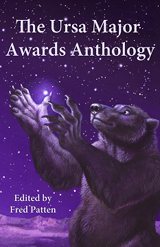 I was recently asked to read and write reviews of two furry anthologies — The Ursa Major Awards Anthology, edited by Fred Patten, and Roar #4, edited by Buck C. Turner.
I was recently asked to read and write reviews of two furry anthologies — The Ursa Major Awards Anthology, edited by Fred Patten, and Roar #4, edited by Buck C. Turner.
I’ll have to preface this with I probably wasn’t the best person to ask to do this – I virtually never read anthologies, and I don’t particularly like short stories. But seeing as I seem to be one of the few people out there who still reads and can put together a semi-coherent review, this makes me one of the go-to people for opinions about furry comics or writing.
Compare: The Ursa Major Awards Anthology as reviewed by Watts Martin, and by dronon.
Since a number of the stories in the Ursa Major Awards Anthology are part of longer series, Editor Fred Patten helpfully writes synopsis of each story’s background, which helps immeasurably if you’re not familiar with particular story world. I’ve actually read several of these stories when they originally appeared, including the first two:
Brock Hoagland’s "Beneath Crystal Seas" is one of many tales of his leopardess street-girl-turned-assassin Perissa. I’ve always liked Brock’s stories, which are easy to read, unpretentious adventures. In this one Perissa, very low on funds, takes a dubious assignment with a charming (and handsome) red fox ship’s captain, who needs a guard while on the hunt for a lost undersea treasure. Battles with sea monsters, a treacherous crew and exotic locations make for fun reading. Perissa is a likeable character, with enough flaws (her lack of sophistication when it comes to valuables causes her some trouble) to make her interesting. If you’re looking for something deep and meaningful, this ain’t it, but if you enjoy sword-and-sorcery and high adventure, this will probably be the best story in the collection.
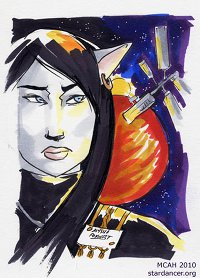 "In the Line of Duty" by M.C.A. (Maggie) Hogarth I first read in Anthrolations, and I’d read other stories with the same setting and character in Yarf about a million years ago. This is hard SF, with junior officer Alysha serving on a Fleet starship sent to rescue a stranded freighter. Complications ensue when it’s discovered the freighter is illegally transporting a large number of refugees, and the only person who knows where on the ship the refugees are located is dead. The rest of the story is a simple race-against-the-clock as Alysha disobeys orders in a desperate attempt to find the refugees before the ship falls into the planet’s atmosphere. Since this is one of many stories featuring Alysha, is this mostly a character piece to show her being heroic no matter what the personal cost. However, of the three hard SF stories here, this is still probably the best one.
"In the Line of Duty" by M.C.A. (Maggie) Hogarth I first read in Anthrolations, and I’d read other stories with the same setting and character in Yarf about a million years ago. This is hard SF, with junior officer Alysha serving on a Fleet starship sent to rescue a stranded freighter. Complications ensue when it’s discovered the freighter is illegally transporting a large number of refugees, and the only person who knows where on the ship the refugees are located is dead. The rest of the story is a simple race-against-the-clock as Alysha disobeys orders in a desperate attempt to find the refugees before the ship falls into the planet’s atmosphere. Since this is one of many stories featuring Alysha, is this mostly a character piece to show her being heroic no matter what the personal cost. However, of the three hard SF stories here, this is still probably the best one.
"Familiars", by Michael H. Payne. High magic, elementals and apprentice wizards at a magic school. Cluny the squirrel is an unusual animal to have as a familiar, so she ends up paired with sub-rate student Crocker. Miscast spells and unintended consequences follow. This is the shortest tale in here, which is good because I had a lot of trouble following what was going on. The fact the two lead character’s names were so close (Cluny and Crocker) meant I was getting confused about who was the squirrel and who was the guy. At least make their names start with different letters! Anything with magic and student wizards taking place at a school will have an unavoidable Harry Potter feel to it, which can be good or bad depending on how you felt about those stories.
"Felicia and the Tailcutter’s Curse" by Charles P. A. Melville is one of many stories featuring his fox sorceress Felicia, who roams and has various adventures in a vaguely medieval furry setting (although sometimes it seems to be closer to early 1800’s in feel.) Attempting to go on a vacation, Felicia ends up at an estate of one Lord Frisky (cat, of course), and is quickly embroiled in an Agatha Christie type murder mystery with plenty of suspects and colorful characters. This is one of those serio-comic stories, with funny character names and comedy relief among the more serious plot. I thought the story was a bit too long, but then again I’m not a huge fan of whodunnits or murder mysteries. This would probably be great for furry fans who do enjoy that genre.
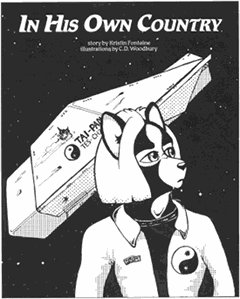
"In His Own Country" by Kristin Fontaine is the second hard SF story, although this too is mostly a character piece, following the skunk character Aubrey Took as he tries to deal with the aftermath of an attempted pirate takeover of the space ship he serves on. Because this story was part of a multi-writer communal writing ‘zine, it suffers from a cast of thousands, and it assumes you already know who everyone is and what their relationship to each other and the ship is. As a reader who is not familiar with the characters and setting, it was tiring to try and keep track of it all. I think I would’ve been more interested to read the story of the actual pirate attack. "In his Own Country" is part police and investigation procedural, and part character angsting over events that happened previously. As a reader with nothing invested in the character or previous stories, I honestly didn’t care about any of it.
"Jacks to Open" by Kyell Gold. Yes, it’s a gay romance and features a fox, just assume that right off the bat. Set in Las Vegas, with a wolf PI card shark, and a fox who may or may not be a hustler at the card table, the main interest in the story is how long it will take before the two of them end up in the sack, and what happens afterwards. The one sort of intriguing twist on this is a deck of cards the wolf inherited that apparently has limited powers to tell the future. This small bit of magic is apparently not unknown, at least to the fox hustler, but the hows and whys of it are never explored.
"Don’t Blink" by Kyell Gold. A newly-minted coyote superhero gets more than he bargained for when he meets his super-villain nemesis. Because this is part of a larger series of stories about a league of canine superheroes, there’s characters that get introduced that clearly will play a larger role in the overall series, but don’t do much here other than provide some color and someone for the protagonist to interact with. As with the other two Kyell Gold stories in this collection, there is a gay element that may cause some eye-rolling, but if that doesn’t bother you the story is well-written and entertaining.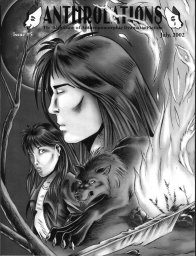 Because I’m not a huge fan of superheroes the story didn’t do a whole lot for me — not bad by any means, but not really what I’m interested in either.
Because I’m not a huge fan of superheroes the story didn’t do a whole lot for me — not bad by any means, but not really what I’m interested in either.
"Six", by Samuel C. Conway (yes, "Uncle Kage.") I read this when it first appeared in Anthrolations, and this is the only story in the collection that follows the ‘furry as lab experiment’ trope, which was very common in the early days of the fandom. A hapless Red Cross volunteer stumbles across an injured furry tiger-type creature while helping out at an apartment fire, and takes it upon himself to nurse it back to health. The story never explains where it came from, why it was there, how it was injured, or, really, anything else an interested person would want to know. It’s a good enough short story, but don’t expect to find any answers to any of the questions raised in it.
"Drifting", by Kyell Gold. Gay slice-of-life, as an immigrant lemur in a dissatisfying relationship with a panther begins to explore the wider world with the help of a fox gym coach. Nothing more or less to it than that — a reader’s enjoyment of this will depend on whether they like slice-of-life and self-discovery stories.
"Ailoura", by Paul Di Filippo, is the 3rd and final hard SF story. A deliberate retelling of the Puss-in-Boots story, this takes place in the far, far spacefaring future of humanity. Geisen, the youngest son of a nobleman is wrongly disinherited from the family business and fortune. With the clever help of his elderly "bestient" cat servant, Geisen prepares to use trickery and guile to win back what is rightfully his. Of everything in this book, "Ailoura" is closest to mainstream SF rather than a furry-specific story. The ‘surprise’ twist at the end was pretty clearly telegraphed, but this was a satisfying yarn and a refreshing break from the stories directly out of furry fandom.
"St. Ailbee’s Hall" by Naomi Kritzer follows another common furry trope — furries as oppressed underclass fighting for equality. In this case the furries in question are ‘enhanced’ dogs used as laborers and domestics. Lisa Erikson runs a shelter for abused and rescued enhanced dogs, and she causes an uproar when one of her rescues, a female husky named Jasper, wants to attend the local Catholic church. The Priest, Father Andrew, has to decide whether to go against the majority of his parishioner’s wishes and not only allow Jasper to attend mass, but baptize her and allow her to take communion. While Father Andrew is sympathetic, things quickly spiral out of control with the less open-minded in the community. "St. Ailbee’s Hall" is a good and readable example of this type of furry story, and is the only story in the collection that touches on religion at all.
Images are provided for illustrative purposes only - the work itself has the cover illustration by Blotch. Comments also available on the reviewer's LJ.
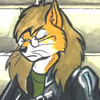
About the author
Martes (Roz Gibson) — read stories — contact (login required)an animator from Santa Clarita, California, United States
Comments
Post new comment